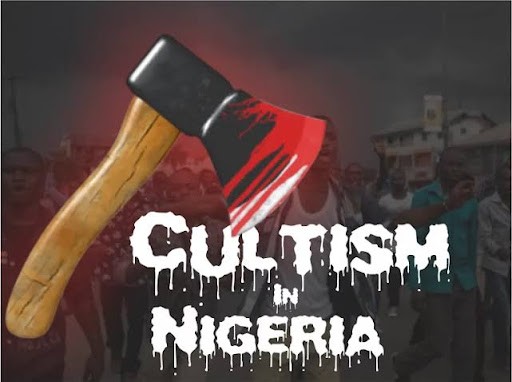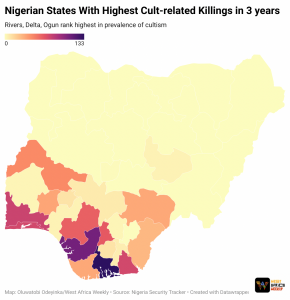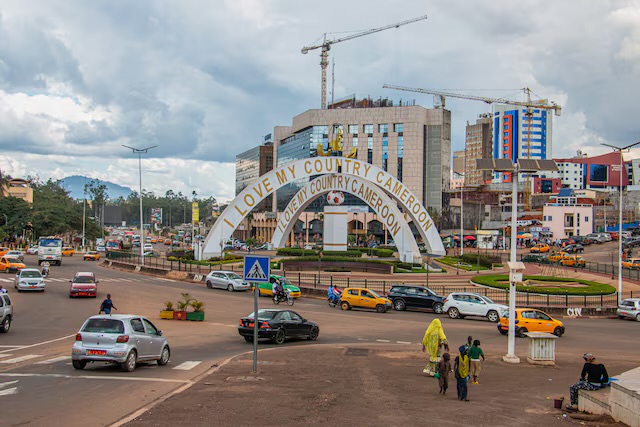
Lip Service And Lost Lives: Nigerian State Governments’ Futile Wars on Cultism

Last month, four students, including two final-year students of Auchi Polytechnic in Edo State, were brutally murdered in a cult rivalry. The previous month, two students of Ambrose Ali University (AAU), Ekpoma, in the same state, were killed in another clash of rivals. Last year, a superintendent of police, Bako Angbashim, was killed and beheaded by suspected members of a cult group in Rivers State.
From the oil-producing states of Rivers, Edo and Delta to Nigeria’s commercial capital, Lagos, and its gateway state, Ogun, blood is frequently spilled, with people butchered in the most gruesome manners and young dreams cut short due to violence involving secret cult groups and societies.
Cultism started in tertiary institutions in the early 70s and has since spread to streets and residential communities, eventually getting into secondary and primary schools. While initiated members kill one another in inter-group clashes and rivalries for dominance, innocent bystanders and residents also fall victim.
The menace of cultism is especially predominant in Nigeria’s Southern half, with states like Rivers, Delta, Edo, Ogun and Lagos topping the chart of cult prevalence and fatalities in the area.

According to a Non-governmental Organisation, Exams Ethic Marshall International (EEMI), cult-related violence within and outside school campuses has claimed no fewer than 10,000 lives between 1996 and 2019. “Hundreds of thousands have been injured, harassed, raped, arrested, detained, suspended and expelled. Lecturers are being intimidated and blackmailed by cultists into awarding unmerited grades, fueling examination malpractices and academic dishonesty,” says the organisation’s founding Chairman, Ike Onyechere.
West Africa Weekly, using data from the Nigeria Security Tracker (NST), found that at least 817 lives were claimed by cultism between January 2020 and June 2023. The NST, a database compiled by the Council of Foreign Relations (CFR), relies on media reports to track violent incidents across Nigeria. However, many cult-related incidents go unreported in the media. They are also not documented by security agencies. In 2021, a Commissioner of the Nigerian Police Force admitted that “about 90 per cent of cult-related deaths in Nigeria are not documented”.
Despite the shortage of data and the underreporting of cult-related violence in the country, the NST tracked 817 killings associated with cultism between January 2021 and June 2023, when the CFR stopped updating the tracker. The data showed that cultism was prevalent in Rivers, Delta, Ogun, Akwa Ibom, Lagos, Anambra and Edo. These states accounted for 593 of the 817 cult-related deaths recorded in the period under review.

State Governments’ Futile Wars
Aware of the daily carnage of cult-related violence, every month, a state governor or House of Assembly declares a war on cultism, sets up committees or holds stakeholders’ meetings to ‘address’ the menace. However, these declarations and expressions of concern are often mere lip service. They do not yield any tangible results, while clashes between cult groups remain rampant, claiming young lives and spreading fear across communities.
In March 2021, the Lagos State House of Assembly passed the anti-cultism Bill, which was signed into law by Governor Babajide Sanwo-Olu. The law stipulates a jail term of 21 years for anyone found to be a member of a cult group or soliciting members of an unlawful society. The same punishment goes for persons who attend meetings of a cult group as well as those who carry out acts capable of endangering the lives of residents. However, the law has not deterred cult activities and violence in the state. Months after the law was enacted in 2021, NST recorded 33 cult-related killings in the state, predominantly in the Ikorodu axis.
In Rivers State – one of the worst hotbeds of cultism in Nigeria – former Governor Nyesom Wike declared wars on cultism at different times. His successor, Siminalayi Fubara, also vowed to go tough on cultists and their enablers. But the state continues to lead the chart of cult-related fatalities in the country.
Last year, the Delta State Government ordered a massive clampdown on cultism and cult-related activities in schools across the state. However, residents have yet to see any clampdown.
Governor Dapo Abiodun, in 2023, announced that his administration would henceforth treat cultism as “an act of terrorism”. He announced while pledging a crackdown on cultists in the state. “I have told the Commissioner of Police that he has no other job until every single member of this cult is found out,” he declared. However, apart from a few arrests, the governor’s declaration has achieved little to no effect, as a clash between Eiye and Aiye confraternities claimed 10 lived in the state capital in April 2024.
In May 2024, members of the Ogun State House of Assembly expressed concerns over escalating cult clashes in the state. They passed a resolution asking the State Government to prevail on the security agencies to clamp down on cultists across the state.
The latest “move to end cultism” has been pushed by a member of the Anambra State House of Assembly, Henry Mbachu, representing Awka 1. On May 30, he convened a security summit involving community leaders, politicians, educationists and security experts to address the menace. Mbachu blamed the menace on the falling moral values amongst the youth and the failure of parents and elders to inculcate moral values in their children.
Despite these war declarations and “efforts” by state governments to address cultism, the rain of terror and brutality by cult groups continues unabated.
Although the NST stopped collating data on conflicts and violence in June 2023, media reports and social media posts show that cult clashes occur almost daily. According to Governor Godwin Obaseki, cult-related violence has claimed over 150 lives in Edo State already this year.
From the academic campuses where it took its root to the streets and communities, cultism has now permeated Nigerian Southern states, cutting down young lives and destabilising communities. Yet, governments continue to offer only lip service, make futile war declarations and convene redundant committees in addressing the bloodsucking menace.
Read more: Extreme Heat Kills Over 550 People During This Year’s Hajj – Officials
About The Author
Related Articles
Tinubu Government Reportedly Paid Millions of Dollars in Ransom to Boko Haram for Release of Kidnapped Schoolchildren
New details have emerged suggesting that the Nigerian Government may have paid...
ByWest Africa WeeklyFebruary 25, 2026Drone Attack Attempt Foiled Near Aguelhok as Two FLA-JNIM Fighters Killed in Explosion
An attempted armed attack on a Malian military convoy near Aguelhok in...
ByWest Africa WeeklyFebruary 23, 2026Nigeria’s New Electoral Act Grants Voting Rights to Prisoners
Nigeria’s newly signed Electoral Act contains a provision that extends voting rights...
ByWest Africa WeeklyFebruary 23, 2026Journalists Detained in Cameroon While Investigating U.S. Deportations
Four journalists were detained in Cameroon while investigating the deportation of African...
ByWest Africa WeeklyFebruary 23, 2026











